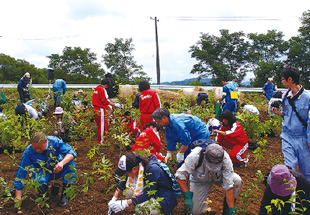Material Balance of DOWA Group
The DOWA group identifies the input of resources and energy into the business activities of the DOWA group ("INPUT") and the output of products produced and the discharged amount of substances imposing environmental burden ("OUTPUT") in each stage of its lifecycle in a quantitative way and conduct business considering material balance.
Material Balance of FY2015
The environmental impact increased compared to FY2015 with the addition of 2 companies, namely, DOWA Thermo Engineering Hamamatsu Kita Plant and PT. DOWA THERMOTECH INDONESIA in Indonesia, but the overall trend has not changed significantly.
For details of items, see Our Initiative to Fight against Global Warming
Resource Recycling in Society and Our Resource Recycling
There are mainly 3 recycling in DOWA group.
First recycling is in-house generation and in-house utilization. Here, the waste material generated in our "Manufacturing businesses" such as smelting and metal processing is recycled in our "Environmental and recycling business", and either sold or re-used as raw materials for the company.
Second recycling is carried out using scrap metal generated during processing in manufacturing plants of other companies. Receiving such material from customer factories that pay for our materials and parts leads to reduction in volume of new resource input such as by re-using the waste as raw material.
Third recycling is recycling of used final products. Through home appliance recycling, automobile recycling, and small appliances recycling etc., used products widely collected from the society are passed on to the society again as metal material.
In this way, The DOWA group strives for effective use of limited resources through three loops, starting with our company's production stage to the waste generated from society. At the same time, as a social responsibility in resource recycling, we aim for a sustainable resource circulation in consideration to environmental protection and energy saving, such as utilizing the heat generated in manufacturing processes as steam or electric power, along with striving to minimize the environmental impact at every stage in recycling, such as appropriate water treatment, detoxification of the waste, secure final disposal.
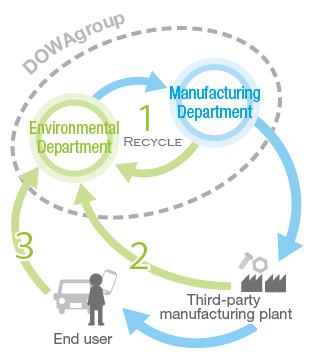
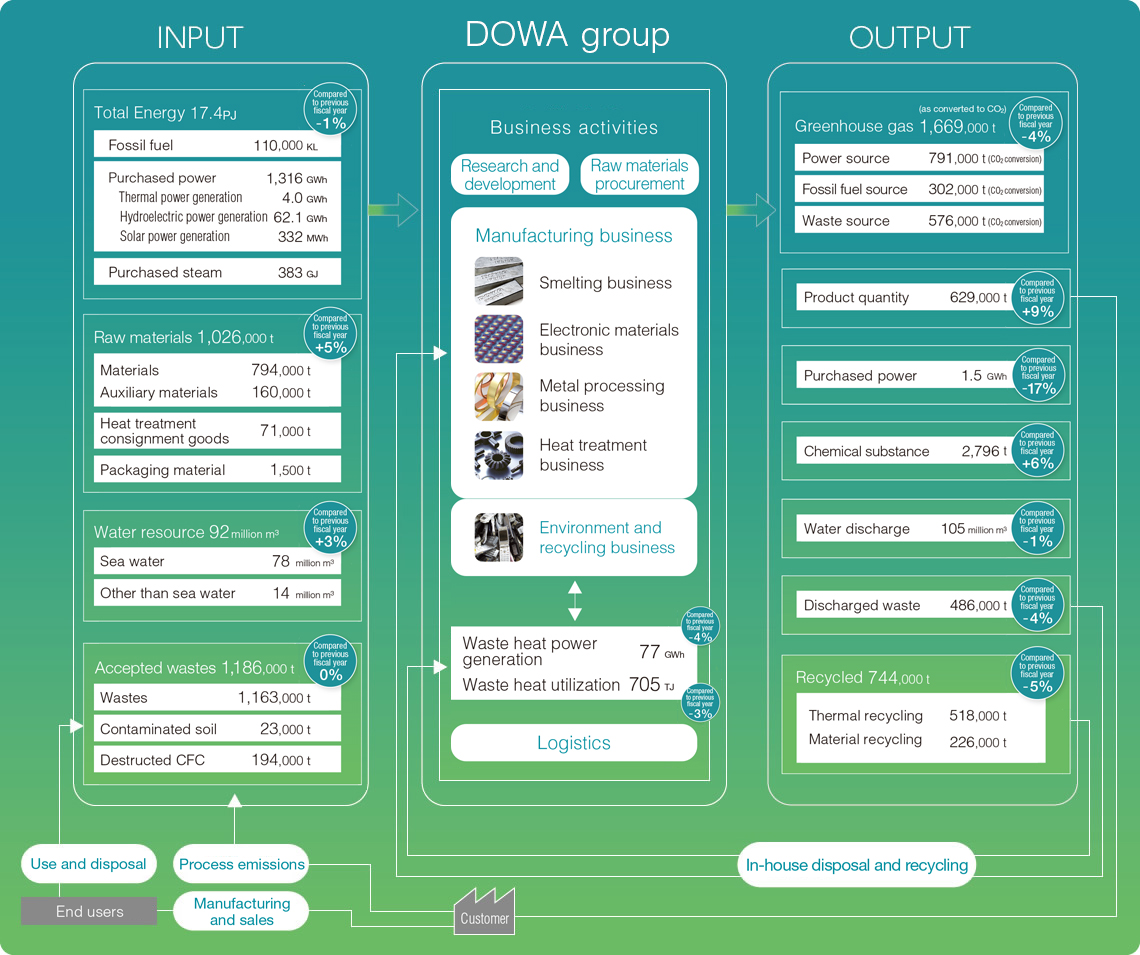
Basic Environmental Policy of the DOWA group
The DOWA group has pointed out that the efforts for environmental protection is an important challenge in corporate management and we have established "Basic Environmental Policy," and as a basic idea of this policy, we are promoting environment management throughout the Group.
The DOWA group shall strive to create the resource-recycling society and shall aim to hand-over the sound global environment to the next generation through our business activities.
- We will provide our customers (clients and local communities) with products and services, which contribute to building a resource-recycling society.
- We will minimize the environmental impact and environmental risk in our business activities.
- We will work on environmental conservation activities across the entire company from the management level to employees together.
[ Basic Environmental Policy Website ]http://www.dowa-csr.jp/en/csr/csr_policy.html
Environment Management System
The CSR department and the planning department of each business office, which perform the environment protection activity, carry out the environment management activities of DOWA group co-operatively.
DOWA Holdings conducts the adjustments and compilation in between each business office and also carries out the environment management and compliance management as an entire DOWA group. In addition, we have acquired ISO14001 for major domestic production sites and international offices, and for proper implementation of the environment management, we are taking efforts for development assistance of internal auditors through the implementation of periodic internal audits & external audits and auditor training courses.
Development of Environment-friendly and Society-friendly Products and Services
The DOWA Group contributes to the creation of a sustainable society by providing materials and services such as metal materials, semiconductors, magnetic materials, etc. that lead to the reduction of harmful substances, environmental preservation, high efficiency of products and long life.
TOPICSExpansion of the Disposal of Low Concentration PCB Waste
What is PCB Waste?
Polychlorinated biphenyl (PCB) has been used for a wide range of applications including electrical and electronic equipment such as transformers and capacitors due to its properties such as its insulation property and incombustibility, however, due to the Kanemi oil case in 1968, toxicity and environmental pollution have become social problems and manufacturing was canceled in 1972. Although the PCB Special Measures Act came into effect in 2001 stipulating to promote reliable and appropriate treatment, a small amount of PCB was found in 2002 in the insulating oil of an electrical equipment which was not supposed to use PCB. Due to this unintentional contamination, traces of contaminated PCB waste and PCB concentration summed up to 0.5–5,000mg/kg of waste and was termed low concentration PCB waste. The volume of waste electrical equipment contaminated with the trace amount of PCBs has been enormous and not yet fully understood, therefore there needs time to strengthen the disposal system so as to complete the process with the statutory deadline of March 2027.
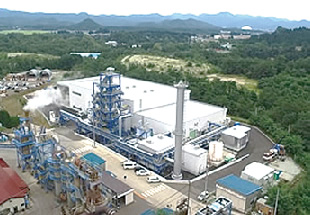
Low Concentration PCB Waste
Detoxification Treatment Facility
(Ecosystem Akita)
Low Concentration PCB Disposal of DOWA Group
The DOWA Group has been involved in the demonstration tests on incineration of trace amounts of PCB-contaminated waste electrical appliances etc. at multiple sites, since 2005 by the Ministry of the Environment, and has started the disposal of mainly the waste electrical equipment in Fukuoka prefecture in FY2010, Okayama prefecture and Akita prefecture in FY2011. In FY2015, we established an incinerator newly for low-concentration PCB waste in Akita Prefecture and obtained the Minister's approval concerning the disposal of waste electrical equipment and others.
We are carrying out not only disposal but also dismantling of large electric equipment on site and transportation, etc. Furthermore, by increasing the processing capacity of DOWA Group from about 30,000 tons per year to about 50,000 tons per year, we are contributing to the promotion of low concentration PCB waste disposal.
Initiatives for Biodiversity
The DOWA Group has been focusing on protecting nature and contributing to local communities, mainly through management of forests owned by the company and afforestation, and further, by establishing the Basic Policy on Biodiversity, the DOWA Group is promoting its initiatives towards grasping the relationship between our business and biodiversity and its impact.
| Biodiversity Basic Policy |
We, the DOWA group, shall recognize the importance of biodiversity conservation to sustainably enjoy the blessing of nature, which are derived from biodiversity and our business activities are benefiting from, and shall voluntary and continuously work on conservation and sustainable use of biodiversity as a member of society. |
| Our Action Policy on Biodiversity Conservation |
1.Identification of business impacts on biodiversity and implementation of activities |
We identify and analyze what type of ecosystem services* our business activities depend and have impact on, and make an effort to avoid and reduce the impacts.
* Ecosystem Services: The benefits we, people, obtain from ecosystems (definition in the UN Millennium Ecosystem Assessment) |
2.Awareness of employees |
We carry out education and awareness-raising of biodiversity on our employees. |
3.Corporate management for sound material cycles |
We strive to create a culture of sound material cycles through sustainable resources use, energy saving and 3R, and to conserve biodiversity through such comprehensive business activities. |
4.Collaboration with various stakeholders |
We promote communication and information sharing on biodiversity conservation, and seek sustainable use of biodiversity with various stakeholders related to our business activities. |
In FY2015, we conducted an investigation to check the biodiversity areas and water sources in the workplace and neighboring areas, the status of greening and conservation activities at each business site, etc. towards formulating a continuous action plan. We are also continuing activities such as planting trees on the site of the mine (Kosaka Town, Akita Prefecture) and promoting biodiversity considerations to our suppliers through CSR procurement.
Biodiversity Conservation in Mining Development
In the DOWA Group's smelting business, we are promoting mine exploration and development projects aiming at a zinc ore ratio of over 50% that was targeted in the mid-term plan. The DOWA Group aims to achieve sustainable development and harmony with the local community by conducting ongoing environmental monitoring from the exploration stage and taking measures to minimize the burden on the environment caused by development and operation.
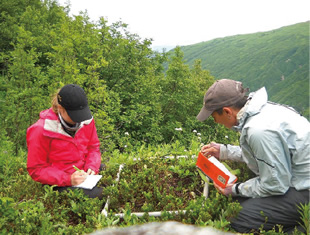
Ecosystem monitoring
(US · Alaska Exploration Project)
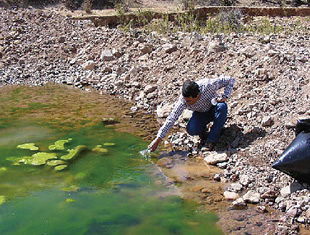
Water monitoring
(Mexico · Chihuahua State Development Project)
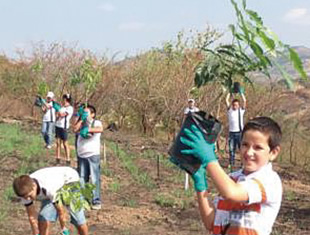
Tree planting activities at Tisapa mine
(Mexico/ State of Mexico)
Our Initiative to Fight against Global Warming
The DOWA group set a goal of "15% reduction of specific consumption of CO2 by 2020, compared to 1990" according to the Action Plan to Implement Low Carbon Society by Keidanren (Japan Business Federation) and the Japan Mining Industry Association (published as of January 2013) as a measure to fight against global warming.
Trend in Greenhouse Gas Emission
The greenhouse gas emissions in the DOWA Group as a whole in FY2015 is approximately 1,669,000 tons of CO (domestic 1,577,000 tons of CO2, overseas 92,000 tons of CO2), and the group's greenhouse gas emission has reduced by approximately 4%.
[ Power source ]
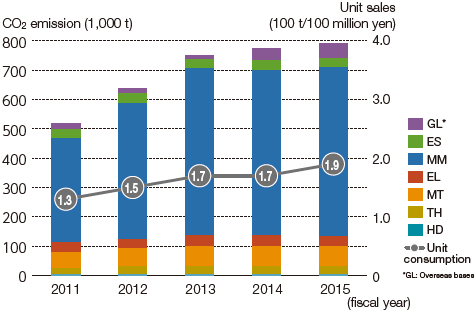
[ Fossil fuel source ]
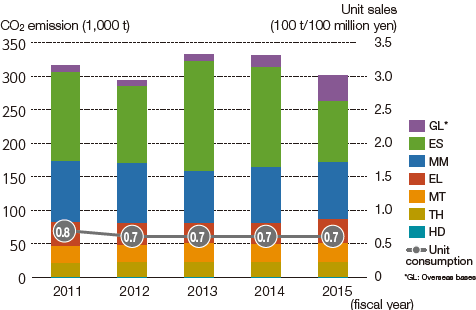
The DOWA Group's CO2 emissions are characterized by large emissions of CO2 due to incineration of waste received externally. It is difficult to reduce the CO2 emission generated from the wastes received due to the control of handling volume, therefore, for effective utilization, we are promoting thermal recycling such as power generation using waste incineration heat and utilization of steam.
Utilization of Natural Energy
In addition to the measures to counter global warming, such as energy saving and fuel conversion, we are working on the utilization of natural energy etc. with less environmental impact.
[Hydroelectric power generation]
The DOWA Group currently owns six hydraulic power stations in Akita Prefecture, and the amount of electricity generated in FY 2015 was 62.1 GWh, which is about 2% less than the previous year. Hydropower utilizing natural energy is an important power source to cover the energy of our smelting business.
[Power generation from waste]
Waste power generation produces steam at high temperature and high pressure by the "heat" when incinerating garbage, and turns the turbine to generate electricity. Currently, we are generating electricity at five plants, that is, 4 in Japan and 1 overseas and the amount of waste heat power used in FY2015 was 76.7 GWh, which is about 4% lower than the previous year.
[Solar power generation]
Solar power generation is influenced by the weather, however, showing the amount of power generation in a visible manner will help in improving the awareness about energy consciousness among employees and also play a role in environmental awareness such as global warming and energy issues. Currently, solar power generation system has been introduced in five domestic plants, and in FY2015 we generated about 332 MWh, contributing to reduction in the emission of CO2.
* As a rule, the amount of CO2 emission is seek based on the emission factors in Law (Global Warming Law) concerning about the promotion of global warming measures for system power purchase amount, fossil fuel consumption and accepted waste. With regard to CO2 emissions from accepting waste, as calculation conditions are set while preparation of this report, it may not necessarily coincide with the reported value to the government. In addition, the classification of waste in Japan and overseas is different; it is difficult to set an appropriate emission factor for the accepted waste at overseas sites, so amount of CO2 emission of waste origin is displayed only for the domestic sites.
Water Environment Conservation
The DOWA Group is working on water conservation and water recycling while considering regional water risks.
Water Resources
About 80% of the water resources used in the DOWA group is seawater used as cooling water in the process of metal smelting etc. For freshwater, we are working on water conservation and recycling within the process for effective use of water resources. In FY2015, the water resource input amounted to 92.5 million m3, which increased by 3% from the previous year mainly due to an increase in cooling water due to increased production. Among that, the amount of freshwater used was 14.4 million m3 which is almost the same level as the previous year.
Wastewater
The amount of wastewater in FY2015 was 105 million m3, which is almost the same with a reduction of 1% from the previous year.
[ Utilization of water resources ]
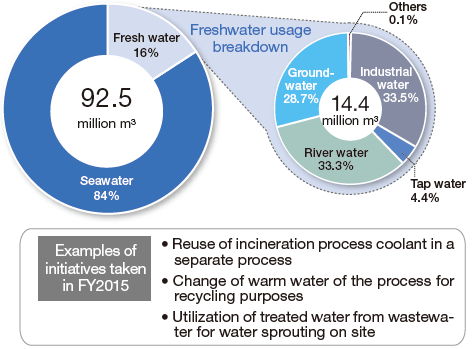
Promotion of Resource Recycling
The DOWA Group is contributing to the formation of a sustainable society by curbing the consumption of natural resources and promoting the cyclical use of used resources.
Raw Material
The amount of raw materials used in FY2015 was 1,026 kt, which is an increase of 5% from the previous fiscal year due to increased production.
Received Waste
The amount of waste received in FY2015 was 1,186 kt, which is almost at the same level as the previous year.
Product
The product volume in FY2015 was 629 kt, which is an increase of about 9% compared to the previous year. This is mainly due to an increase in zinc production in the smelting business.
Disposed Waste
The volume of disposed waste in FY2015 was 486 kt, which is a decrease of approximately 4% compared to the previous year.
Recycling
In FY2015, the recycling volume was 744 kt, which is a decrease of approximately 5% from the previous year. Of these, 221 kt were recycled in the DOWA group, and 523 kt were recycled outside the company.
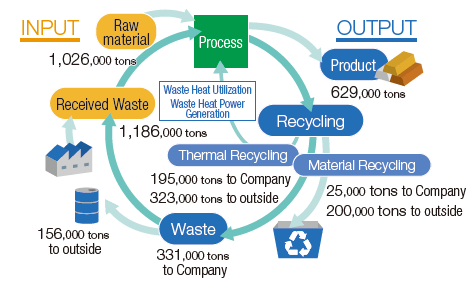
TOPICSFY2015 Environment Minister's Award for Promotion of Recycling-based Society
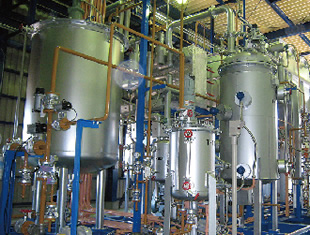
Biodiesel Okayama in Okayama Prefecture has collaborated with the Okayama city in 2008 for recovering waste edible oils discharged from general households, restaurants, food manufacturing factories, etc. to produce biodiesel fuel (BDF) of 500 kg or more. The produced BDF is mainly used as a substitute fuel for diesel oil used in garbage trucks in Okayama City and it is also used for vehicles such as private civic route buses in the city, forklifts in the DOWA office, etc. In the manufacture of BDF, we adopt a system that does not generate wastewater taking the environment into consideration, besides, in addition to daily inspections, we also conduct activities such as evaluation at an external organization four times a year to ensure thorough quality management.
Evaluating our initiatives on environmental education such as allowing elementary children to have a tour of the factory and production of high quality BDF, we were recognized for 3R excellence and awarded "FY2015 Environment Minister's Award for Promotion of Recycling-based Society" in FY2015.



